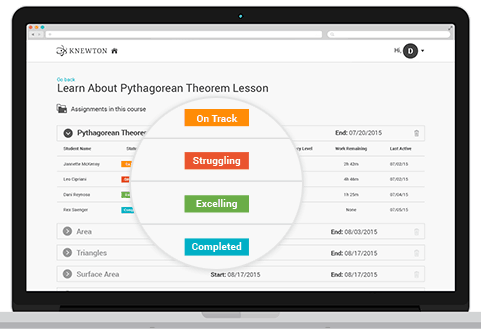Knewton Brings Adaptive and Personalized Learning to the Masses

Adaptive learning combines adaptive assessment and targeted tutoring — learning challenges get harder with correct answers and easier with incorrect answers. With adaptive learning, each student pathway is unique.
Widely used adaptive systems like Curriculum Associates’ i-Ready (K-8 reading and math) and DreamBox Learning (K-8 math) have demonstrated strong results (and both are Getting Smart advocacy partners). ALEKS from McGraw Hill is widely used in high school and college math. They provide useful instructional data for teachers and personalized learning for students.
Until recently, K-12 adaptive learning was only available within proprietary systems. This allowed developers to use quality design principles and tagging schemes providing a consistent user experience.
In Getting Smart on Next-Gen Learning Platforms, we reviewed the progress of adaptive learning platforms like Fishtree and RealizeIt. These platforms, most commonly used in career and technical training, can quickly ingest and tag diverse content. Assessment authoring tools allow program managers to build competency-based gateways.
Teach to One from New Classrooms uses 10,000 learning modules from many providers. The recommendation engine is driven by an exit ticket, a quick daily end of class assessment.
The challenge has been building an adaptive platform that easily incorporates new content while maintaining a decent learner experience–with an engine smart enough to recognize what learner experiences work better than others so that the system gets smarter over time.
In an announcement this week Knewton claims to have cracked the code with an open adaptive learning platform for everyone.
Users are organized as teachers, parents, and students. All three user types can upload content, and create assignments and courses that meet learning goals. Courses consist of at least one assignment. As users work through assignments and courses, the platform calibrates and adjusts to learning preferences.
How Knewton.com works. According to Knewton.com:
“Knewton.com figures out what each student knows and how each student learns best, to pinpoint the type of content, level of difficulty, and which media format each student needs. Its technology can take any free open content, algorithmically calibrate it, and bundle it into a uniquely personalized lesson for each student at any moment,”
After $100 million and seven years of production, the platform was launched with a several hundred thousand pieces of open content covering K-12 math, English, and science.
Anticipating the launch of Knewton was Michael Horn, co-author or BLENDED, in an article on Forbes.com:
Knewton, an adaptive learning company, has long been discussed as one of the exciting entities in education circles, but few could put their hands around what exactly they were doing and what their impact has been—or will be. The promise—adaptive learning across virtually any content area to a very fine grain—has been intriguing but uncertain. In 2015, certainty about Knewton will increase, and what it does, its potential impact, and its visibility will, too.
Guided by the mission to bring personalized learning to everyone, everywhere, the Knewton team is touting their platform as “the world’s most powerful adaptive learning engine.” Jose Ferreira, CEO Knewton said, “we think of it as a genius robot tutor in the cloud.”
With claims like these, and nods from Wired, The Today Show, and even bridging the general audience gap with a piece Buzzfeed, Knewton is launching with support.
The Knewton business model is based on enterprise sales of the platform to institutions and content providers.
There are a handful of vendors well down the path of high quality adaptive learning with great content and strong service. An open adaptive platform is the holy grail but it’s yet to be seen how this platform will compete on quality and support.
The future of learning will be personalized and context-driven. The launch of Knewton.com is an interesting step forward. Tools and technology will continue to improve and learning will become more tailored and accessible. There’s no doubt that personalizing the learning experience is becoming norm.
For more, check out:
- Implementation Challenges on the Path to Personalization
- Push Learning: How Smart Notifications Will Change Education
- The Future of Learning: Compelling, Customized, Connected & Competency-Based






0 Comments
Leave a Comment
Your email address will not be published. All fields are required.